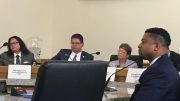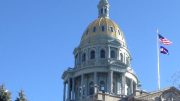By Jeffrey A. Roberts
CFOIC Executive Director
The Colorado Supreme Court on Monday affirmed a judicially created doctrine that lets public bodies “cure” violations of the Colorado Open Meetings Law at subsequent meetings that do not merely rubber-stamp earlier decisions.
But it also ruled that a plaintiff is entitled to recover costs and reasonable attorney fees if a COML violation is proven in court.

The case concerned the Woodland Park school board, which in January 2022 discussed a memorandum of understanding with Merit Academy charter school under a “BOARD HOUSEKEEPING” agenda item.
Although a district court judge found that the vague description violated the law’s notice provision, he later determined that the board had cured the violation during an April 2022 meeting, applying the doctrine established in 2012 by the Court of Appeals in Colorado Off-Highway Vehicle Coalition v. Colorado Board of Parks and Outdoor Recreation.
The judge and the Court of Appeals also decided that plaintiff Erin O’Connell was not a “prevailing party” entitled under the law to recover costs and reasonable attorney fees. But the Supreme Court reversed that portion of those rulings, concluding that O’Connell should be awarded fees because she successfully proved a violation by the school board that wasn’t cured until after she filed a lawsuit.
The school board claimed that O’Connell was not a prevailing party because it conceded the open meetings law violation in a motion for summary judgment. But “the logical consequence of the School Board’s position would take the teeth out of the COML,” Justice Maria Berkenkotter wrote for the court’s majority. “By conceding a violation, a public body could effectively prevent the award of costs and reasonable attorney fees to prevailing plaintiffs even though they are a mandatory consequence for a violation of the statute.”
The Colorado Freedom of Information Coalition and other organizations argued for reversing the lower courts’ fees decision in an amicus brief filed with the Supreme Court last October. “Transparency and citizen participation in government processes are among the most fundamental principles of a democracy,” CFOIC’s brief said. “Allowing retroactive validation of public bodies’ prior unlawful decisions, taken in violation of the COML, while eliminating penalties for such violations eviscerates our sunshine laws.”
The Supreme Court in its ruling examined the cure doctrine, holding that it “does not contravene the COML or longstanding precedent.”
“To ‘cure’ a COML violation does not mean that there was no prior violation or that the subsequent action erases a prior violation,” Berkenkotter wrote. “Instead, to ‘cure’ a violation means that, under the COML, an entity can conduct a complying meeting after a violation and confirm the prior action, retroactive to the first meeting.”
The open meetings law says that “no resolution, rule, regulation, ordinance, or formal action of a state or local public body shall be valid unless taken or made at a meeting that meets the requirements” of the statute.
But “[r]equiring a governmental body to start all over (i.e. not allowing the ‘cure’) would be inconsistent with the proper functioning of the government and, consequently, the COML,” the justices concluded. “This is because the focus of the COML ‘is on the process of governmental decision making, not on the substance of the decisions themselves,’” Berkenkotter added, quoting the Court of Appeals’ 2012 opinion.
“It follows, then, that when a public body provides an opportunity for citizens to participate in the decision-making process in a subsequent compliant meeting, that opportunity — so long as it is not a mere rubber stamp — cures the prior violation. This aligns with the purpose of the COML.”
In the 2012 Colorado Off-Highway Vehicle Coalition decision, the Court of Appeals determined that a subsequent meeting of the parks board was not a rubber-stamping of an earlier decision because the board “heard additional comment from several ‘key players’ … heard public comment from many interested parties, and engaged in renewed deliberations before announcing its ultimate decision.”
Regarding the Woodland Park school board’s April 2022 meeting that cured the violation of January 2022, the Supreme Court noted that it was held after full and timely notice to the public, which the open meetings law requires, under an agenda item labeled “Discussion and Reconsideration of Re-Approval of MOU with Merit Academy.”
The appellate court “reached this conclusion after highlighting the extended controversy and press coverage surrounding Merit Academy’s admission into the School District and the fact that the April 13 meeting was the third time the MOU had been presented to the public,” Berkenkotter wrote.
Chief Justice Monica Márquez dissented from the court majority on the attorney fees question. She argued that O’Connell should not be awarded fees because the open meetings law violation had been cured.
“A cure is a complete remedy; it fully repairs the legal defect of the earlier act,” Márquez wrote. “… Here, because the violation was cured (allowing the School Board’s initial decision to have legal effect), a court cannot ‘find[] a violation’ under section 24-6-402(9)(b) to serve as a basis for an award of costs and fees.”
O’Connell is represented by attorneys Carrie Lamitie and Eric Maxfield, who is a CFOIC board member.
Follow the Colorado Freedom of Information Coalition on X or BlueSky. Like CFOIC’s Facebook page. Do you appreciate the information and resources provided by CFOIC? Please consider making a tax-deductible donation.




